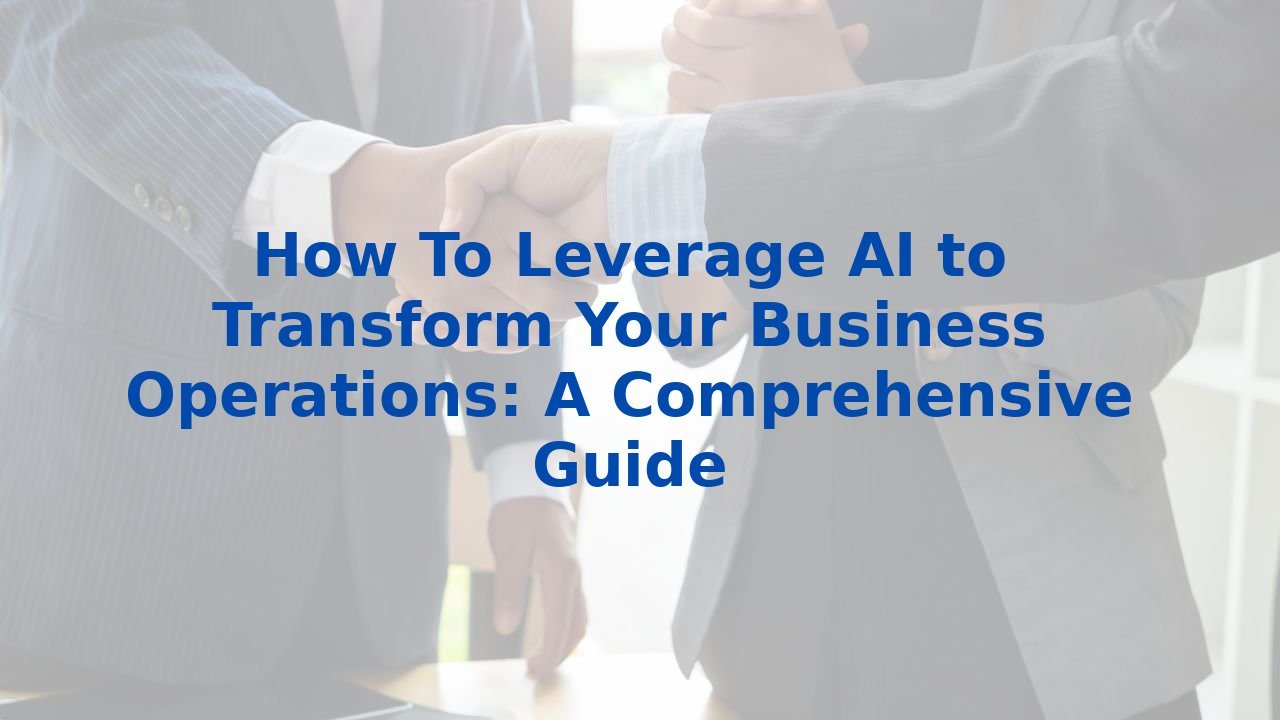How To Leverage AI to Transform Your Business Operations: A Comprehensive Guide
The Impact of Artificial Intelligence on Business Operations
Artificial intelligence (AI) has become a cornerstone in the way we do business, breaking down traditional barriers and fostering an environment where efficiency reigns supreme. In this guide, we will explore the business processes that AI can enhance and how organizations can leverage this technology for transformative change.
Introduction to AI in Business
At its core, artificial intelligence refers to the development of systems capable of performing tasks that typically require human intelligence, including problem-solving and analytics. The journey of AI has evolved from simple rule-based systems to complex machine learning and deep learning frameworks. This evolution places AI at the heart of modern business strategy.
Enhancing Efficiency with AI
The most prominent advantage of AI is its potential to automate repetitive and time-consuming tasks. By deploying AI, businesses can redirect their resources to higher-value activities. For example, organizations today can use AI to handle customer service inquiries, assess credit applications, and expedite insurance claim processing. These functions, once burdensome for human teams, can now be executed with lightning speed and reduced error rates.
Data-Driven Insights
In the age of information, having access to accurate data is paramount. AI excels in parsing substantial datasets to extract actionable insights, leading to informed decision-making. By leveraging AI's analytical power, businesses can refine their forecasting methods, minimize risks, and formulate strategic plans. Imagine a supply chain that adjusts in real-time to consumer behavior or operational shifts—AI makes this possible by optimizing inventory and reducing unnecessary waste.
Personalized Customer Experiences
Personalization is a driving force in customer satisfaction, and AI is at the forefront of this movement. By analyzing customer data patterns, businesses can craft tailored marketing campaigns, offer customized product recommendations, and deliver personalized customer service experiences. This meticulous attention to individual preferences doesn’t just enhance user satisfaction; it fosters lasting loyalty.
AI in Supply Chain and Logistics
The integration of AI technologies into supply chain and logistics processes marks a significant leap in operational efficiency and responsiveness. Utilizing AI to analyze past data allows businesses to anticipate demand fluctuations, ensuring optimal stock levels and curbing waste. Furthermore, automating ordering processes significantly aids in timely replenishment. Breakthroughs like autonomous vehicles and drones are reshaping delivery landscapes, ensuring swift and efficient operations round the clock.
Benefits of Training Employees for AI
While AI can streamline countless tasks, the human element remains irreplaceable. Properly training employees to work alongside AI technologies is essential for maximizing the benefits of these systems. Employees must be equipped to interpret AI-generated insights, effectively utilize AI tools, and weave AI into their daily activities. This transformation not only enhances productivity but also leads to richer decision-making capabilities, merging the strengths of human intuition with the precision of artificial intelligence. Organizations can further explore employee training options through resources that focus on developing AI skills across the workforce.
Future of AI in Business
The trajectory of AI in the business landscape points toward even more profound transformations. Emerging trends such as generative AI and explainable AI are set to redefine operations and strategic decision-making. Additionally, AI holds the potential for driving sustainable practices by optimizing resource allocation, reducing waste, and creating innovative solutions to environmental challenges. Businesses can utilize AI for efficient supply chains and proactive risk management, paving the way for a more sustainable future.
Conclusion
Artificial intelligence is reshaping business operations by automating tasks, offering valuable data insights, and enhancing the customer journey. Organizations ready to embrace AI can improve efficiency, bolster decision-making abilities, and secure a competitive edge in an ever-evolving market. However, to truly harness the capabilities of artificial intelligence, investing in employee training is crucial. By equipping the workforce with the necessary skills to utilize AI effectively, businesses position themselves to reap the full rewards of this groundbreaking technology.



